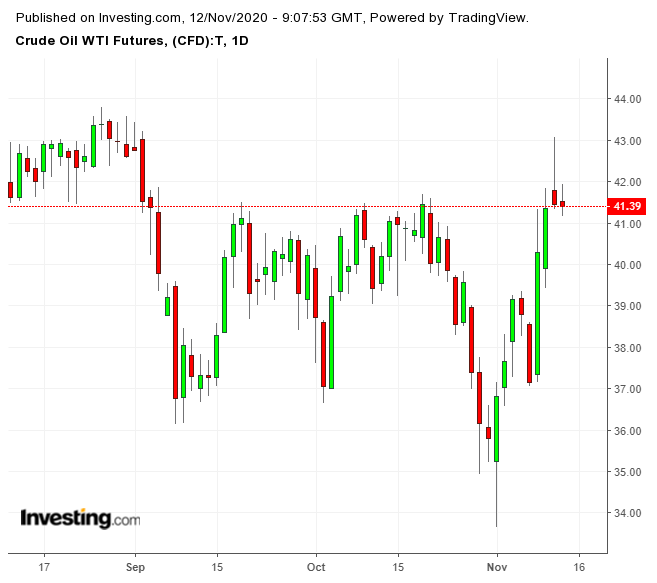Monday’s news that Pfizer's (NYSE:PFE) coronavirus vaccine may be 90% effective boosted stocks across much of the market. Travel-related businesses saw the most gains, and oil companies also saw their share prices rise.
ExxonMobil (NYSE:XOM) and Chevron (NYSE:CVX), for example, saw their stocks gain as much as $4.70 and $12.14, respectively. In the commodities markets, both WTI and Brent have made relatively substantial gains since the announcement, nearly recovering losses suffered since the summer driving season ended.

These moves seem to be largely fueled by vaccine headlines, speculation and trading amplification.
In reality, the supply and demand picture for oil in the fourth quarter of 2020 and first quarter of 2021 is not a positive one. Below we'll take a closer look:
Demand
The month-long lockdowns recently implemented in Europe, are taking a significant bite out of demand, as this column discussed last week. Now, states and significant metropolitan areas in the United States appear to be following suit. Massachusetts, New Jersey and New York have all issued overnight stay-at-home orders, curfews and/or restrictions on private gathering in personal residences this week.
There will likely be significantly less travel for the upcoming Thanksgiving holiday, after records in air and car travel were set last year. This does not bode well for the Christmas holiday season, either in the United States or Europe, as lockdowns, curfews and travel restrictions will make it nearly impossible to travel even for those who are willing.
Major forecasting institutions have slashed their expectations for demand, again. Almost halfway through the quarter, OPEC in particular made a serious downgrade to its 2020 Q4 demand projection—a 960,000 bpd reduction. This could be read as the organization’s attempt to push member nations towards a production cut promoted by Saudi Arabia, but it’s not the only forecasting group to come out with downward revisions on their demand outlooks this week.
The U.S. EIA cut its forecast for 2021 demand growth by 360,000 bpd and revised its forecast for U.S. gasoline demand down 300,000 bpd in Q4 2020. The IEA will issue its revised forecast on Thursday, after the writing of this column, but statements by an IEA official earlier this week indicate that they see the new European lockdowns as a threat to oil demand.
Supply
On the supply side, OPEC+ is expected to agree to backtrack on planned production increases. It is possible, though not guaranteed that the group will be able to reach a consensus on additional cuts, to be implemented in January. However, this will likely be overshadowed by the return of Libyan oil to the market. Libyan production is on track to hit 1.3 million bpd within a month and the country's national oil company says that Libya won’t comply with any OPEC quotas until it stabilizes its production at 1.7 million bpd.
There is some bullish news from the United States, as data from API and the EIA have indicated that U.S. crude oil stocks continue to see significant draws. According to the EIA, U.S. production is at 10.5 million bpd. That is much lower than the 13 million bpd record set in early 2020, but the output numbers are better than some expected at the height of the coronavirus hysteria in the spring and summer.
Producers continue to tap drilled but uncompleted wells (DUCs) for cheaper oil to sell, and oil rig count is now back to May levels. At 226, rig count is still significantly lower than the 683 oil rigs active in March, but the decline seems to have reversed itself. Rig numbers have been steadily climbing throughout most of October and November.
It’s possible that U.S. production could experience another drop because new drilling is not keeping up with depletion rates, but the dynamic is very complicated. Each company differs in its profile of assets, cash flow, drilling costs, DUC inventory, and price point needed to increase production. Traders will need to see more data before making that call.
Conclusion
The reaction of oil prices this week has reflected a fantasy based on the promise of a vaccine rather than actual fundamentals relevant to the contracts being traded.
However, sometimes the market sentiment is as important as supply and demand. The continuing drama surrounding the U.S. presidential election has had little impact on this week’s movement, and a market that is acting based on the reported promises of a complicated pharmaceutical may be a market that lacks predictability or stability.
What if the vaccine production or distribution faces problems or proves to be less effective than believed? On the other hand, what if the vaccine is a miracle drug?
So much depends on future news reports that are not contingent on oil fundamentals.
